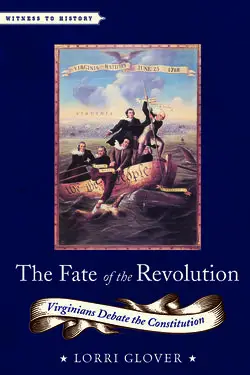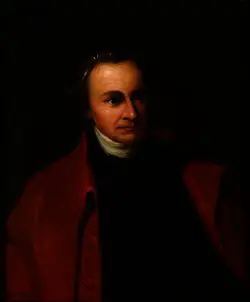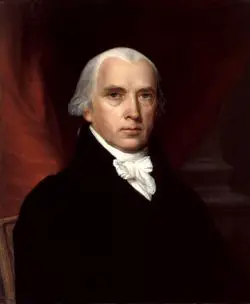Fate of the Revolution: Interview with Lorri Glover
Starting in 1787, states began to ratify the newly drafted federal Constitution which would determine the fate of the new American Republic. In order for the Constitution to go in effect, nine of the states needed to agree to the document. While five states quickly ratified the Constitution between December 1787 and January 1788, the country's eyes stayed on Virginia. Virginia was the most populated and largest state and it was critical for the state to ratify the Constitution to legitimize the process.
Lorri Glover's new book, The Fate of the Revolution: Virginians Debate the Constitution published by Johns Hopkins University Press, explores the dramatic battle that took place during the Virginia Ratification Convention. Virginia's convention was notable because some of the most influential founding fathers had staked out positions on the Constitution in stark opposition to one another. As Patrick Henry, James Madison, James Monroe, George Mason and John Marshall publicly debated the merits of the new Constitution, the nation waited for a decision. Glover explores the constitutional questions that divided Virginia and shows how these questions are still relevant in understanding the Constutition.
Lorri Glover is the John Francis Bannon Professor of History at Saint Louis University. She has written extensively about the early American Republic and the founding fathers. She has also written Founders as Fathers: The Private Lives and Politics of the American Revolutionaries (Yale University Press, 2014), The Shipwreck that Saved Jamestown: The Sea Venture Castaways and The Fate of America, with co-author with Daniel Blake Smith (Henry Holt Publishers, 2008), Southern Sons: Becoming Men in the New Nation (Johns Hopkins University Press, 2007), and finally All Our Relations: Blood Ties and Emotional Bonds Among the Early South Carolina Gentry (Johns Hopkins University Press, 2000). You can learn more about her books at lorriglover.com.
Here is our interview.
Why did you become interested in the Virginia Ratifying convention? What drew you this subject?
I was working on another book, Founders as Fathers: The Private Lives and Politics of the American Revolutionaries, when I got captivated by this spectacular collision of wills between so many giants of the Revolutionary Age. I found it fascinating that a cohort of Virginians, who came out of the same culture and worked side by side during the imperial crisis and the war years, could reach radically different conclusions about the Constitution. Half the states’ leaders (and citizens) believed the Constitution betrayed the Revolution, and the other half was convinced it fulfilled the Revolution.
Aside from the Constitution, what were Virginians concerned about in 1788? What type of local political factors impacted the discussions at the ratification convention?
Well, the ratification question overshadowed nearly everything else in Virginia politics from October 1787 to June 1788. As one man put it, debating the Constitution consumed everyone “from the Governor to the door keeper.” But Virginians were also deeply concerned about navigation rights on the Mississippi River, and they read those anxieties onto the Constitution. Residents of the western region of Virginia, which later became Kentucky, were especially worried that the federal government would sacrifice their access to the Mississippi to advance the international trading interests of the northeastern states. Also Virginians—supporters and critics of the Constitution alike—were keenly proud of their state. Virginia had been the oldest of the English American colonies and it was the largest state geographically and the most heavily populated. One in six Americans called Virginia home in 1787. Everyone seemed anxious about Virginia’s place in the union of states and protective of its power in the young country.
Who were the leading figures in this debate? What positions did they stake out?
The formal debates in Richmond, in June 1788, were one of the greatest dramas in all of American history. In no other gathering during the entire revolutionary era was there so fierce a contest between so many talented, famous, and committed leaders. Patrick Henry, the greatest orator of the age, insisted the Constitution betrayed the Revolution’s deepest principles. He was joined by George Mason, who wrote the Virginia Declaration of Rights and conceived the first state constitution in America, and by the war hero and future president James Monroe. They faced off against James Madison, the principal architect of the Constitution and probably the greatest intellectual force of that generation. George Washington, already beloved as the “father” of the country, worked behind the scenes to help Madison. And Madison joined forces at the Richmond convention with John Marshall, the future Chief Justice of the Supreme Court, and Virginia’s popular governor, Edmund Randolph. Men on both sides agreed on one thing: they would be deciding, “not the welfare of a state, but, that of mankind.”

What did the opponents of Constitution want instead? What vision did these people have for a federal government?
This question reveals a major obstacle facing the critics of the Constitution: the lack of a consensus alternate plan. Some opponents to ratification wanted a bill of rights added to the federal plan. Others wanted structural changes to the design, particularly regarding the powers that states would retain. And still others condemned every part of the Constitution for creating an irremediably dangerous government. At the same time, no one wanted to return to the flawed Articles of Confederation. So, advocates for ratification asked, what did the critics want instead? The answer never became clear in the formal debates in Richmond. Madison hammered his opponents on this point all month long—and to great effect.
Originalism has been a big topic in Constitutional law for the past 30 years. The problem I have always found with originalist interpretations of the Constitution was that they failed to accurately represent the variety of views held by people during this era. Would you agree that there were very different interpretations and views on what the Constitution was designed to accomplish? Is there a good way to categorize these differing interpretations?
Absolutely, I agree. We’ve made “The Founders” into a single, timeless monolith. The truth is much messier and fluid and, I think, much more interesting and inspiring. Leading members of the Revolutionary generation disagreed vehemently about the Constitution, and many changed their minds over time. The best way to think about the question of the “original” intentions of the founders is to ask “who?” and "when?” Take just James Madison. In 1787-1788, he argued that a Bill of Rights was completely unnecessary. By 1790, he was leading the effort in the U.S. Congress to create one and get it ratified. Between 1787 and 1790 Madison was probably George Washington’s most trusted ally. But soon thereafter Madison was partnering with Thomas Jefferson to organize an opposition faction to President Washington—because they did not agree with his interpretations of the Constitution. So, there were not only a variety of views held by different people of this era. Men changed their minds over time, too. Madison cautioned us against originalism: late in his life he wrote that the work of the framers at the Philadelphia Convention “could never be regarded as the oracular guide” to the Constitution. “Life and validity were breathed into it, by the voice of the people, speaking through the several state conventions.” Whether we like it or not, we have always reinterpreted the Constitution to fit the shifting times.
What is the most important thing that we need to understand about the ratification debate over the Constitution?
Virginians (and Americans generally) were so profoundly divided over the Constitution that it nearly failed to be ratified. The decision to ratify or reject would, Americans understood, determine whether their brief experiment with representative democracy could survive. The problem came when large numbers of citizens became firmly convinced that their future depended on ratifying while others believed with the same unshakable faith that theirs depended on rejecting. The final vote in Virginia was 89-79. Five votes out of 170 swung the other way would have turned the fate of the American Revolution in a radically different direction. Votes in other states were very close too, which is usually surprising to most Americans. The founding generation came very, very close to making the Constitution a failed side note in history.
What surprised you the most when you were researching this project?
I was surprised over and over again. My favorite surprise came just after the final vote in Virginia. The New Hampshire and New York conventions were meeting at the same time as the Virginians, and as they debated, eight of the required nine states had already ratified. Alexander Hamilton, working for ratification in New York, had coordinated a team of riders in all three convention cities to speed to the other two locations as soon as any final vote occurred. As the Virginians began their last days of debate, they had no way of knowing that New Hampshire ratified on June 21. Virginians thought they were the 9th state when they ratified on June 25. Sometime before dawn on June 28, two riders, one from Richmond and other carrying news from New Hampshire, met at a tavern in Alexandria. They became the first two men to know that both New Hampshire and Virginia had ratified, and the Constitution would become law.
How would you recommend using your book for a US colonial history class?
The book is part of a series out of Johns Hopkins University Press, called “Witness to History.” The Fate of the Revolution, like all the books in the series, aims to immerse the reader in a crucial event in American history. The thesis and interpretations are embedded, and a character-driven story is foregrounded. So I hope the book will be engaging for students to read and that it will open up the world of eighteenth-century politics. I also hope that this story from the founding era will inspire conversation about our own world. Many of the issues they confronted—balancing individual rights with public safety, for example—are impossible to definitively resolve, and so they remain deeply divisive today. We, like the Virginians in 1787-88, still have to debate and decide the future of our American Republic.
Related DailyHistory.org Articles
Admin and EricLambrecht



